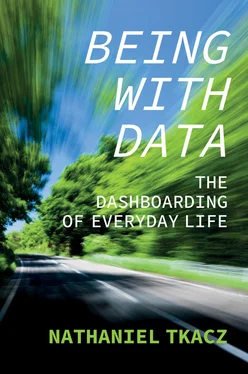28 28. Latour and Callon, ‘“Thou Shall Not Calculate!”’, 3.
29 29. Latour and Callon, ‘“Thou Shall Not Calculate!”’, 5.
30 30. Latour and Callon, ‘“Thou Shall Not Calculate!”’, 4.
31 31. Bruno Latour, Politics of Nature: How to Bring the Sciences into Democracy (Cambridge, MA: Harvard University Press, 2004), 117.
32 32. Hans Derks, ‘Religion, Capitalism and the Rise of Double-Entry Bookkeeping’, Accounting, Business & Financial History 18, no. 2 (July 2008), 188.
33 33. Poovey does not work with a theory of formats, though she does explicitly refer to DEB as a format. See Poovey, History of the Modern Fact, 60.
34 34. Poovey, History of the Modern Fact, xii.
35 35. Poovey, History of the Modern Fact, 42.
36 36. Poovey, History of the Modern Fact, 42.
37 37. Poovey, History of the Modern Fact, xvii.
38 38. James A. Aho, ‘Rhetoric and the Invention of Double Entry Bookkeeping’, Rhetorica: A Journal of the History of Rhetoric 3, no. 1 (1985), 42.
39 39. I draw the reader’s attention again to the work of James Aho, who some decades ago undertook a close comparative reading of DEB as a work of rhetoric. See Aho, ‘Rhetoric and the Invention of Double Entry Bookkeeping’. See also Bruce G. Carruthers and Wendy Nelson Espeland, ‘Accounting for Rationality: Double-Entry Bookkeeping and the Rhetoric of Economic Rationality’, American Journal of Sociology 97, no. 1 (1991).
40 40. Poovey, History of the Modern Fact, xxv.
41 41. Cited in Eve Chiapello, ‘Accounting and the Birth of the Notion of Capitalism’, Critical Perspectives on Accounting 18, no. 3 (1 March 2007), 264.
42 42. Werner Sombart, ‘Medieval and Modern Commercial Enterprise’, in Enterprise and Secular Change, ed. Frederic C. Lane and Riemersma Jelle (Homewood, IL: Irwin, 1953), 38.
43 43. See Aho, ‘Rhetoric and the Invention of Double Entry Bookkeeping’; Carruthers and Espeland, ‘Accounting for Rationality’.
44 44. Although I have not explored this in any detail, the point is made strongly in the work of James Aho, as well as that of Bruce Carruthers and Wendy Espeland. See Aho, ‘Rhetoric and the Invention of Double Entry Bookkeeping’; Carruthers and Espeland, ‘Accounting for Rationality’.
45 45. See ‘Culture Is Ordinary’ in Raymond Williams, Resources of Hope: Culture, Democracy, Socialism (London: Verso, 1989), 3–18.
46 46. Lev Manovich, Cultural Analytics (Cambridge, MA: MIT Press, 2020); Lev Manovich, ‘The Science of Culture? Social Computing, Digital Humanities and Cultural Analytics’, SocArXiv (22 August 2018).
47 47. See Virginia Eubanks, Automating Inequality (New York, NY: St Martin’s Press, 2018); Safiya Umoja Noble, Algorithms of Oppression: How Search Engines Reinforce Racism (New York, NY: NYU Press, 2018); Cathy O’Neil, Weapons of Math Destruction: How Big Data Increases Inequality and Threatens Democracy (London: Penguin, 2017); Caroline Criado Perez, Invisible Women: Exposing Data Bias in a World Designed for Men (London: Chatto & Windus, 2019).
48 48. I believe he goes by the name of Waldo in North America.
49 49. Raymond Williams, The Long Revolution (Harmondsworth: Penguin, 1965), 56.
50 50. Williams, Long Revolution, 57.
51 51. Bruno Latour, ‘Technology Is Society Made Durable’, in A Sociology of Monsters: Essays on Power, Technology and Domination, ed. John Law (London: Routledge, 1991).
52 52. Alison Hulme, ‘Following the (Unfollowable) Thing: Methodological Considerations in the Era of High Globalisation’, Cultural Geographies 24, no. 1 (12 May 2016); Arjun Appadurai, ed., The Social Life of Things: Commodities in Cultural Perspective, new edition (Cambridge: Cambridge University Press, 1988); Ian Cook and Michelle Harrison, ‘Follow the Thing: “West Indian Hot Pepper Sauce”’, Space and Culture 10, no. 1 (1 February 2007); George E. Marcus, ‘Ethnography in/of the World System: The Emergence of Multi-Sited Ethnography’, Annual Review of Anthropology 24 (1995).
53 53. Ian Hacking, The Taming of Chance (Cambridge: Cambridge University Press, 1990); Gerd Gigerenzer et al., The Empire of Chance: How Probability Changed Science and Everyday Life (Cambridge: Cambridge University Press, 1989); Desrosières, Politics of Large Numbers; Hacking, Emergence of Probability; Poovey, History of the Modern Fact; Porter, Rise of Statistical Thinking; Porter, Trust in Numbers; Rosenberg, ‘Data before the Fact’.
54 54. For those interested, see Kent C. Redmond and Thomas M. Smith, From Whirlwind to MITRE: The R&D Story of the SAGE Air Defense Computer (Cambridge, MA: MIT Press, 2000); Morton M. Astrahan and John F. Jacobs, ‘History of the Design of the SAGE Computer: The AN/FSQ-7’, Annals of the History of Computing 5, no. 4 (October 1983); David Caminer et al., LEO: The Incredible Story of the World’s First Business Computer (New York, NY: McGraw Hill, 1998); Georgina Ferry, A Computer Called LEO: Lyons Tea Shops and the World’s First Office Computer, new edition (London: Harper, 2010); Eden Medina, Cybernetic Revolutionaries: Technology and Politics in Allende’s Chile (Cambridge, MA: MIT Press, 2014).
55 55. Robin de Mourat, Donato Ricci and Bruno Latour. ‘How Does a Format Make a Public?’, in Reassembling Scholarly Communication: Histories, Infrastructures, and Global Politics of Open Access, ed. Martin Paul Eve and Jonathan Gray (Cambridge, MA: MIT Press, 2020), 104.
56 56. N. Katherine Hayles, Unthought: The Power of the Cognitive Nonconscious (Chicago, IL: University of Chicago Press, 2017).
Конец ознакомительного фрагмента.
Текст предоставлен ООО «ЛитРес».
Прочитайте эту книгу целиком, купив полную легальную версию на ЛитРес.
Безопасно оплатить книгу можно банковской картой Visa, MasterCard, Maestro, со счета мобильного телефона, с платежного терминала, в салоне МТС или Связной, через PayPal, WebMoney, Яндекс.Деньги, QIWI Кошелек, бонусными картами или другим удобным Вам способом.


![Элизабет Ленхард - Свидание со смертью[Date With Death]](/books/79651/elizabet-lenhard-svidanie-so-smertyu-date-with-dea-thumb.webp)









